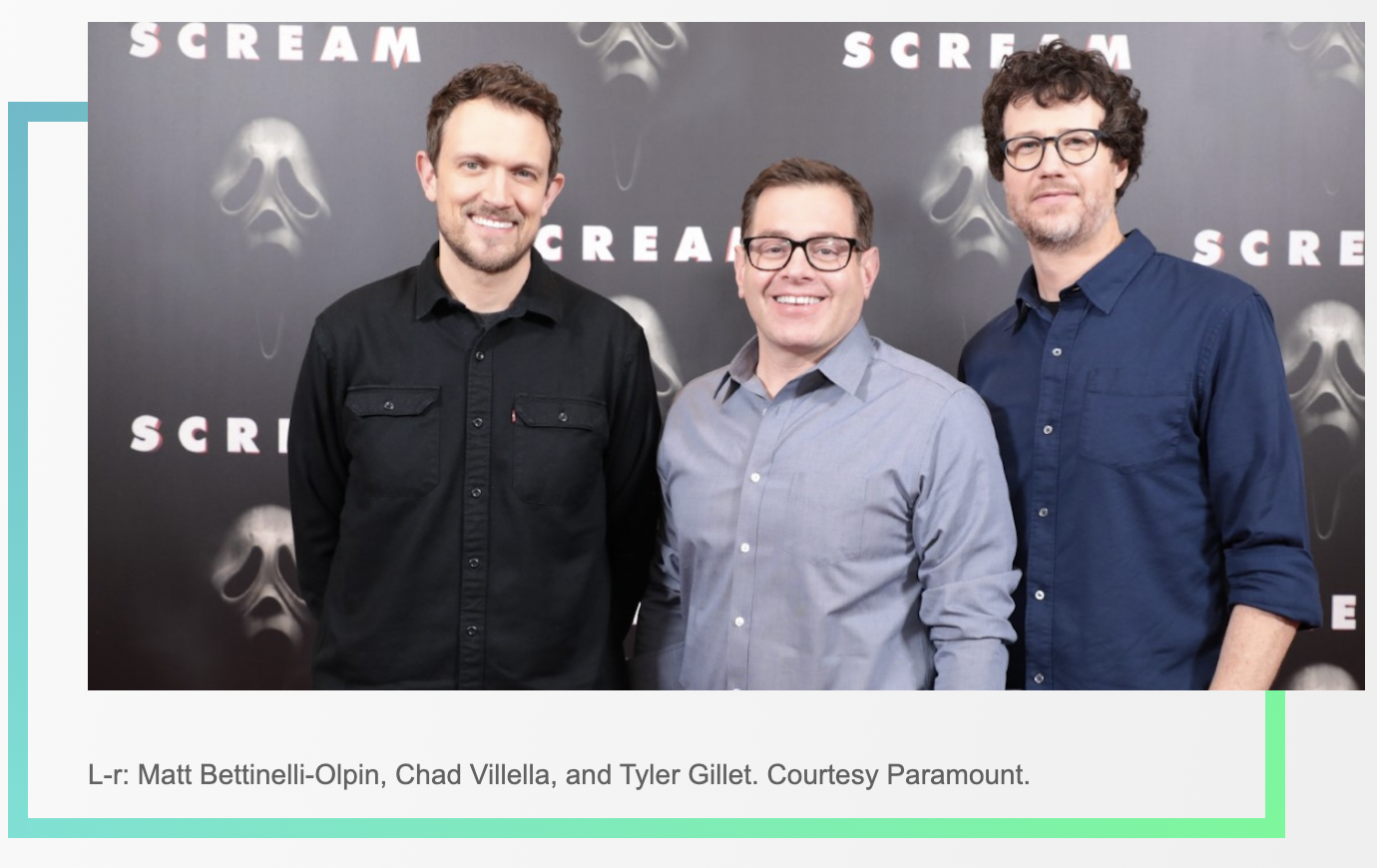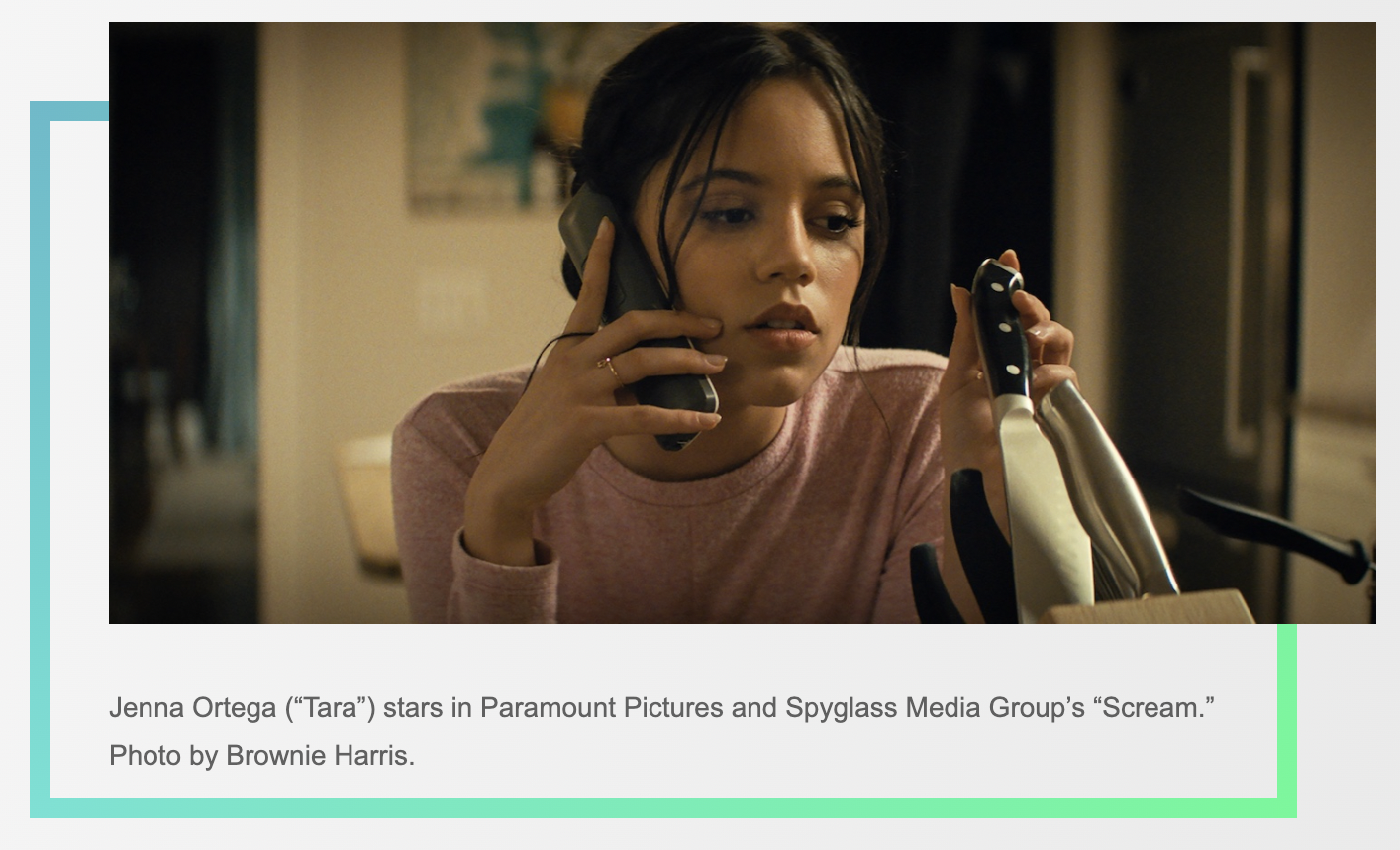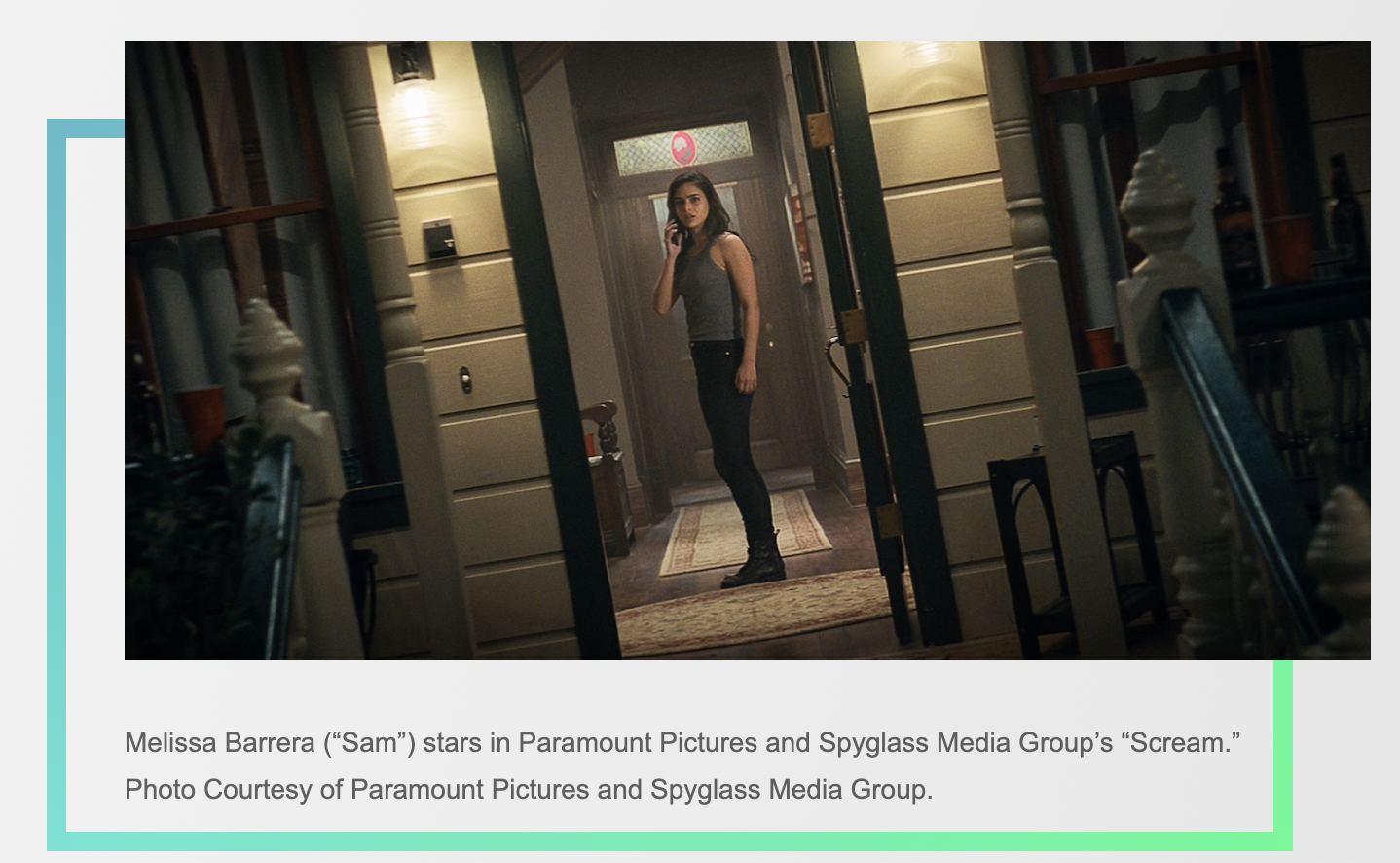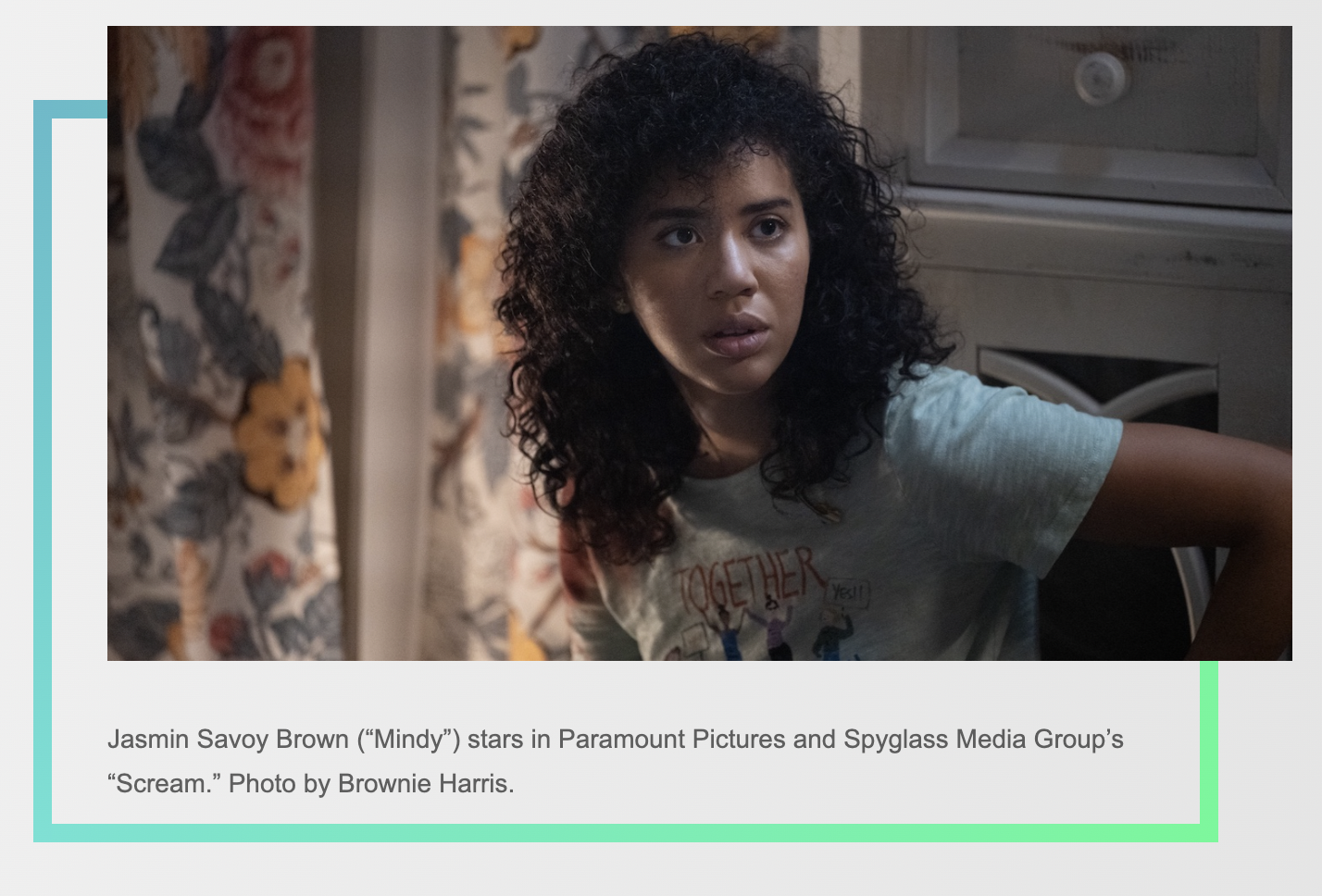
How do you create the fifth film in a beloved slasher franchise that’s both a nod to everything that’s come before, a clever meta-commentary on horror films and toxic fandom, and something that’s entirely your own? This was one of the questions we put to Scream directors Tyler Gillett and Matt Bettinelli-Olpin and their producing partner and the third member of their Radio Silence triumvirate, Chad Villella. The trio has once again brought the same passion that imbued their last outing, Ready or Not, with such razor-sharp wit.
In tackling Scream and titling their film simply Scream, they delivered a “requel,” a hybrid reboot/sequel that is as spiritually linked to Wes Craven’s seminal 1996 original, while delivering a deliciously brutal evolution on the themes Craven and original Scream writer Kevin Williamson explored. To make matters even more complicated, they were creating a new installment of the franchise in the midst of a moment where the horror genre is attracting some of the brightest filmmakers in the game, including Jordan Peele and Ari Aster. Their Scream doesn’t shy away from acknowledging this moment of elevated horror. In fact, it doesn’t shy away from the question of why this film needed to exist in the first place.
Their Scream explores the arrival of a new Ghostface, a game cast of newcomers, and the return of Westboro’s legendary survivors, Sidney Prescott (Neve Campbell), Gale Weathers (Courtney Cox), and Dewey Riley (David Arquette) returning.
We spoke with the Radio Silence team about legacy, layered commentary, and going for the jugular with a laugh.

How did you do the difficult work of honoring Wes Craven’s original while also not losing your own style, voice, and vision?
Matt: I think one of the things we realized through this process is so much of our DNA and our voice comes from growing up on Wes Craven movies and movies like that. It sort of formed who we are. When we made Ready or Not, we were talking about Scream a lot. So it feels like a weird, sort of surreal dream come true, and the exact thing we would want to do if we could just choose something. The balancing act was one of the main tenets of our entire process. How do we make sure this is a love letter to the original movies, and also in the same way those movies constantly subvert your expectations and still create something that takes a step forward and doesn’t get stuck in the past. That’s something we talked about a lot. Scream kind of gave us that permission just by the way those movies did that.
Tyler: There’s also something about the process of making movies. It feels like it happens really quick, but it’s really pressure over time. When you’re in the making of something, you’re showing up every day, you’re making thousands of tiny little choices that ultimately cumulatively become the thing that people see. Our process is just ours, we’re three people who have been working together for a long time, we’re ultra collaborative, and we have a very specific shared taste. I think over the course of the hundreds of days it takes to put something together, your sensibilities naturally steer you towards your thing. It’s intentional, but it’s a collection of choices you’ve made over a long creative process.
How did you view the challenge, Chad?
Chad: It’s hard to explain what we do every day, but it’s also very difficult to remove ourselves from that process. Our fingerprints are all over this, but of course it’s heavily influenced by Wes Craven, and not just with Scream but with everything that Wes did. It’s so vital for us and the reason we became filmmaker sin the first place. We started off with more of a comedic sensibility in the early days when we were doing YouTube things, then we found our comedy got darker. That was our gateway into our horror present and what we bring to the genre.
I’m curious how you construct a scary moment? What’s the Radio Silence team’s DNA of a scare?
Tyler: We come from action-adventure comedy. We talk a lot about how crafting a joke and crafting a scare are really similar. The mechanics of building each of those are really in parallel with each other. For us, we certainly have a shared taste about what’s scary. We think a really grounded approach to those moments is going to yield a surprising break in tension, and also that feeling of wanting to laugh. That reaction is at the absolute nexus of what we love and what we think our unique tone is. That moment where you’re scared and you’re laughing at the same time, those two things can coexist in a single moment. When we’re on set actually crafting a scare, it’s always funny. There’s this idea that when you’re shooting a scary movie that everyone on set is really scared, but for us, it always feels like you’re shooting a comedy. The make believe is at such a high level and there’s a level of absurdity in what you’re creating, you can’t help but just have fun when you’re creating a scary sequence.
Chad: We have a very dark sense of humor, I guess. [Laughs].

I imagine you’ve analyzed other horror movies beat-by-beat?
Matt: Yeah, that’s a part of the process for a few reasons. First, you want to see what’s been done and make sure you’re not doing that again. Then, just as students of films we want to study the greats, so we spent a lot of time doing that. And then I think there’s just something important for us to constantly remind ourselves why things work, what works about them, and use that, hopefully, to our benefit. In this process, we watched the original Scream films a million times, but part of it was finding out what makes them unique because the Scream scares are slightly different than some other genre movies, because they live in that heightened, one inch above grounded level. I feel like you can do the scary stuff that’s really f**king terrifying, but our goal is to always do the scary stuff that’s hopefully terrifying but allows you, moments later, to be relieved. To not live in a two-hour pounding of your emotions, but live in something you can have fun with.
Tyler: Not to get too granular, but that’s a thing that’s so tuned in the edit. In the process of making this, there were certain music cues where you’re cutting something and you’re always using temporary music, and it was really a challenge to find the right piece of temp music to make the sequences not feel cruel. To make the Ghostface kills feel like they’re scary and thrilling but not cruel. We kept telling ourselves that if it’s cruel, it’s the wrong thing. It should be horrifying and thrilling, but it can’t feel cruel, it can’t feel mean. It’s a real granular distinction, but it’s something you feel, like, oh, the movie’s not having fun anymore, it’s too serious, we’re not in a popcorn movie now. There are a million little ingredients to that.

We’re in such a different era for horror films, as you guys touch upon in the film, with horror movies now as singular and elevated as Jordan Peele’s work, Ari Aster’s movies…
Matt: They’re incredibly well made.
Tyler: They’re brutal, as intended. You survive the experience of watching those movies.
Matt: I have one quick point, though, which is I feel like Jordan Peele gets lumped in with elevated horror a lot, but to me, his movies are wildly fun. Which is interesting, I just wanted to throw that out there.

Casting is obviously so huge. You’ve got the legacy characters coming back, but walk me through the process of finding the newcomers.
Chad: I think that goes right back to us approaching making this movie and having the most fun we possibly can. Obviously, we sat down with our casting director Rich Delia and were like, these characters are going to be carrying on the legacy of Scream, and when first started sitting down with everybody, we just wanted to have conversations with them and see what their feelings were about horror movies and the Scream franchise specifically. Did they approach it as fans? Or, was it something that wasn’t really in their wheelhouse but they were willing to do because they’re all professional actors? I think what we ended up with our new cast, they all approach it with this admiration and love for everything that is Scream. We basically had conversations with them and not auditions, hearing their stories about what Scream means to them and how horror has changed their lives. So we got into their characters more that way, which is super beneficial when we’re making a meta-movie about horror and the current state of horror.
Tyler: This is weirdly similar to Ready or Not, and part of that I think is the sensibility we share with the writers, Jamie [Vanderbilt] and Guy [Busick] who we know really dearly. We owe so much to the script. The characters in the script, the tone of the movie, it’s all on the page. We can’t stress how valuable that is in the process. Because the thing that’s getting sent out, the thing that people are responding to, how they approach a read during an audition, that sense of fun is actually in the writing. So when somebody gets it and you just know, oh right, they totally understand what this weird thing is trying to achieve at its best. It makes the target really small and really specific, and we love that about Guy and Jamie’s words.
Chad: What’s meta on top of this is the script comes from people who loved Scream. So it’s fans writing a Scream movie about fans talking about movies, there are so many layers.
Matt: I’d also just say that Scream in its inception is about a love of movies. That’s the foundation that all of this is built on, what Kevin Williamson first wrote. We got to make a movie that is not only a love letter to the Scream franchise and to Wes Craven, but also to movies in general. We love movies. I know that sounds basic and corny, but it’s true, we’ve dedicated our lives to movies.
This article was first published on The Credits on Motion Picture Association